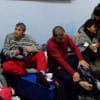The deadly, murky history of the rules-based order

Since Russia's invasion of Ukraine in February 2022 (the conflict between the two countries actually began in 2014 following a US-engineered coup, but the Western media won), the world has been deluged with shrill cries of outrage by the West, led by the United States. The US and the West have been lecturing the rest of the world about them being the guardians of democracy for decades. What has been remarkable since Russia invaded Ukraine is the sanctimonious frenzy. We are told that the war in Ukraine is not, as many of us believe, a complex dispute over autonomy for an ethnic minority in a multi-ethnic state, but that the Russian attack is a civilisational challenge to a global "rules-based order."
What is this "rules-based order"? This month provides a harrowing historical landmark of what an ugly turn that order has taken in the past.
Twenty years ago on March 20, the US attacked Iraq. It had twisted many an arm, but failed to get the UN Security Council to agree. No matter. So much for rules. The war left a terrible legacy for Iraqis.
"No one knows with certainty how many people have been killed and wounded in Iraq since the 2003 United States invasion. However, we know that between 280,771 and 315,190 have died from direct war-related violence… from the time of the invasion through March 2023," according to Brown University's Watson Institute. "The violent deaths of Iraqi civilians have occurred through aerial bombing, shelling, gunshots, suicide attacks, and fires started by bombing."
So here we are, then, a fearsome war between Ukraine and Russia, and the West, with its fierce Manichean take on it, is demanding that everyone else join its righteous battle to slay the dragon – evil Russia.
That's not all. "Several times as many Iraqi civilians may have died as an indirect result of the war, due to damage to the systems that provide food, healthcare and clean drinking water," the Watson Institute report adds. "The war has compounded the ill effects of decades of harmful US policy actions towards Iraq since the 1960s, including economic sanctions in the 1990s that were devastating for Iraqis."
The harrowing historical landmark I refer to, however, goes back over half a century.
Fifty-five years ago, on March 16, 1968, in the Vietnamese village of My Lai, US soldiers went in and slaughtered 347 to 504 villagers. They were unarmed – almost all of them being old men, women, and children. Women were gang-raped. Even animals were killed in a wanton, pointless act of brutality.
If the Vietnam war was part of a rules-based order, the rules must have been made in hell.
In a decades-long war against a small, impoverished, agrarian country halfway around the world, the US, the world's mightiest nation, unleashed a carnage of extraordinary ferocity and barbarity. According to Vietnam, over two million Vietnamese civilians died. More bombs were dropped in that tiny country than during World War II; the country was smothered in incendiary napalm bombs and tons of carcinogenic Agent Orange.
I bring up the My Lai massacre because while the Iraq war was relatively recent, the Vietnam war has receded from public memory.
There are other fascinating historical strands that connect the past to the present. After the My Lai massacre, the US Army attempted a cover-up, but the person who broke the story was a tenacious reporter. Seymour Hersh won the prestigious Pulitzer Prize for bringing the horrific details to the attention of the US public.
Fast forward a few decades. In the early days of the US occupation of Iraq, a prison in Abu Ghraib, one of the most notorious in the time of Saddam Hussain's rule, was converted into a US military prison. In April 2004, the US television network CBS published photos of torture and abuse that shocked and outraged the world. The US Army and the CIA committed a series of human rights violations and war crimes against detainees in Abu Ghraib.
In the same year in April, Seymour Hersh, who broke the My Lai story, wrote a series of three articles in The New Yorker magazine discussing the abuses in detail. The magazine also published a report on its website by Hersh, along with a number of images of the torture, taken by US military prison guards.
Abu Ghraib, in my mind, is to the Iraq war what My Lai is to Vietnam. In both cases, stark, relatively small-scale events epitomise the depravity and essential lawlessness of the two US campaigns.
Another common thread that runs through Abu Ghraib and My Lai is the astonishingly poor accountability. In the case of My Lai, the only person who was ever actually convicted was a low-level officer, Lt William Calley, Jr. He was sentenced to life imprisonment; he ultimately served around two years. In the case of Abu Ghraib, a few low-level US military personnel were tried and punished.
But these abuses did not happen in a vacuum. Officers higher up than the ones charged allowed the killings to happen and condoned and even tried to cover them up. Nothing ever happened to them.
I am sure the avid readers will find the name of Seymour Hersh familiar. Hersh has been in the news for publishing an explosive report that claims that the US was behind blowing up the Nord Stream 2 pipeline in September last year that transports Russian natural gas. The Western mainstream press has ignored or pooh-poohed Hersh's claim, instead quoting anonymous intelligence sources to suggest that the explosions may have been caused by a rogue Ukrainian group – a theory that strains credulity.
So here we are, then, a fearsome war between Ukraine and Russia, and the West, with its fierce Manichean take on it, is demanding that everyone else join its righteous battle to slay the dragon – evil Russia.
Yet, the Global South – India, China, Latin America, Africa – is sceptical at best. For many, once you remove the fancy packaging of the "rules-based order," what lurks underneath is an equally sanctimonious and unconvincing claim of yesteryear – the entire world is "the White man's burden."
Ashfaque Swapan is a writer and editor based in Atlanta, US.

 For all latest news, follow The Daily Star's Google News channel.
For all latest news, follow The Daily Star's Google News channel. 










Comments